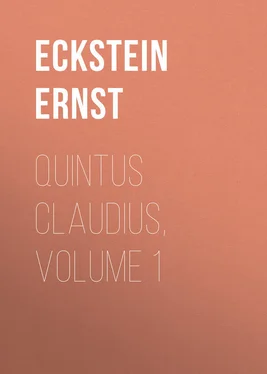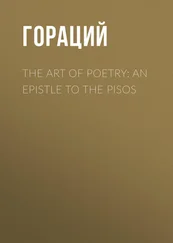Ernst Eckstein - Quintus Claudius, Volume 1
Здесь есть возможность читать онлайн «Ernst Eckstein - Quintus Claudius, Volume 1» — ознакомительный отрывок электронной книги совершенно бесплатно, а после прочтения отрывка купить полную версию. В некоторых случаях можно слушать аудио, скачать через торрент в формате fb2 и присутствует краткое содержание. Жанр: foreign_antique, foreign_prose, на английском языке. Описание произведения, (предисловие) а так же отзывы посетителей доступны на портале библиотеки ЛибКат.
- Название:Quintus Claudius, Volume 1
- Автор:
- Жанр:
- Год:неизвестен
- ISBN:нет данных
- Рейтинг книги:4 / 5. Голосов: 1
-
Избранное:Добавить в избранное
- Отзывы:
-
Ваша оценка:
- 80
- 1
- 2
- 3
- 4
- 5
Quintus Claudius, Volume 1: краткое содержание, описание и аннотация
Предлагаем к чтению аннотацию, описание, краткое содержание или предисловие (зависит от того, что написал сам автор книги «Quintus Claudius, Volume 1»). Если вы не нашли необходимую информацию о книге — напишите в комментариях, мы постараемся отыскать её.
Quintus Claudius, Volume 1 — читать онлайн ознакомительный отрывок
Ниже представлен текст книги, разбитый по страницам. Система сохранения места последней прочитанной страницы, позволяет с удобством читать онлайн бесплатно книгу «Quintus Claudius, Volume 1», без необходимости каждый раз заново искать на чём Вы остановились. Поставьте закладку, и сможете в любой момент перейти на страницу, на которой закончили чтение.
Интервал:
Закладка:
“There is no doubt about it,” muttered Quintus, when he had once more carefully examined every detail. “This is in hot earnest, and she commands me to meet her with the assurance of a goddess. And with all her domineering confidence, what sweet coaxing – what inviting tenderness! It would be treason to the divine influences of Venus to hesitate. Nay, fair unknown! – for you must surely be fair – beautiful as the goddess whose inspiration fires your blood! Nothing but beauty can give a woman courage to write such words as these!”
He replaced the note in his bosom and took the same path that he had trodden a few hours since with Aurelius; listening sharply on each side as he got farther into the thicket, and keeping his hand on his dagger, he slowly mounted the hill. All nature seemed to be sleeping, and the distant cry of a night-bird sounded as if in a dream. Before long he had reached the spot where the path turned off to the pavilion. The little temple stood out in the moonlight as sharply as by day against the dark-blue sky, like an erection of gleaming silver and snow; the light seemed to ripple on the marble like living, translucent dew – and, in the middle, the goddess sat enthroned! – a tall form robed in white, her face veiled, motionless as though indeed a statue. Quintus paused for an instant; then he mounted to the top and said bowing low:
“Unknown one, I greet thee!”
“And I thee, Quintus Claudius!” answered a voice that was tremulous with agitation.
“You, madam, have commanded, and I, Quintus Claudius, have obeyed. Now, will you not reveal the secret I am burning to discover?”
The veiled lady took the young man gently by the hand and drew him tenderly to a seat.
“My secret!” she repeated with a sigh. “Can you not guess it? Quintus, divinest, most adorable Quintus – I love you!”
“Your favors confound me!” said Quintus in the tone of a man to whom such phrases were familiar. His unknown companion threw her arms round him, leaned her head on his shoulder, and burst into tears.
“Oh, happy, intoxicating hour!” she breathed in a rapturous undertone. “You, the noblest of men, my idol, whom I have thought of so long, watched with such eager eyes — you , Quintus, mine – mine at last! It is too much happiness!”
Quintus, under the stormy fervor of this declaration, felt an uneasy mistrust which he tried in vain to repress. This despotic “mine – mine” gave him a sensation as of the grip of a siren. He involuntarily rose.
“My good fortune takes my breath away!” he said in flattering accents; doubly flattering to atone for the hasty impulse by which he had stood up. “But now grant my bold desire, and let me see your face. Let me know who it is, that vouchsafes me such unparalleled favors.”
“You cannot guess?” she whispered reproachfully. “And yet it is said, that the eyes of love are keen. Quintus, my beloved, Fate denies us all open and unchecked happiness; it is in secret only that your lips may ever meet mine. But you know that true love mocks at obstacles – nay more, the flowers that blossom in the very valley of death are those that smell sweetest.”
Quintus drew back a step.
“Once more,” he insisted, “tell me who you are?”
The tall figure raised a beautiful arm, that shone like Parian marble in the moonlight, and slowly lifted her veil.
“The Empress!" 95 95 The Empress Domitia. The emperor’s wife was Domitia Longina, the daughter of Corbulo, and formerly the wife of Aelius Lamia, (Suet. Dom. 1).
cried Quintus dismayed.
“Not ‘the Empress’ to you, my Quintus – to you Domitia, hapless, devoted Domitia, who could die of love at your feet.”
Quintus stood immovable.
“Fear nothing,” she said smiling. “No listener is near to desecrate the perfect bliss of this moonlit night.”
“Fear?” retorted Quintus. “I am not a girl, to go into fits in a thunder-storm. What I resolve on I carry out to the end, though the end be death! Besides, I know full well, that your favors bloom in secret places – as silent and as harmless as the roses in a private garden.”
Domitia turned pale.
“And what do you mean by that?” she asked shuddering.
“You live far away from Caesar, your husband; you are served by spies; your palace is a labyrinth with a hundred impenetrable chambers…”
“Indeed!” said Domitia, controlling her excitement. “But still, I saw you start. What dismayed you so much, if it was not the suspicion of danger?”
“You know,” answered the young man hesitating, “that I am one of those who are ranked as Caesar’s friends. 96 96 Caesar’s friends. Among the “friends ( amici ) of the emperor,” were included those persons, who not only regularly shared the social pleasures of the sovereign, but were invited to consult with him on all important government business. Within this group of friends there were of course inner, outer, and outermost circles. Quintus, who had little intercourse with the court, can only be included in the outermost circle of all, and even there more on account of his father, who was one of the emperor’s most intimate “friends,” than by virtue of his own relations with the palace. He of course had a right to appear at court, like all persons of his rank, even without a special “relation of friendship” to the emperor. When inner and outer circles of friends are mentioned, this must not be confounded with the different classes of friends. Belonging to the first or second class implied a distinction of rank . Of course, in this sense, Quintus could only be numbered among the first class ( primi amici ).
A friend – though merely an official friend – cannot betray the man he is bound to defend.”
Domitia laughed loudly.
“Fine speeches, on my word!” she exclaimed scornfully. “Friendship, for the executioner who cuts your head off! Fidelity to a bloodthirsty ruffian! No, Quintus – I know better. You are staunch, but not from fidelity – from prudence!”
Quintus struck his breast proudly with his hand.
“You force me,” he said, “to speak the truth, in spite of my desire to spare you. You must know then, that Quintus Claudius thinks better of himself than to stoop to be the successor of an actor!”
“Mad fool! what are you saying…”
“What I was bound to say. You thought I was afraid; I am only proud. No, and if you were Cypris 97 97 Cypris. A name given to Aphrodite, the goddess of love, from the island of Cyprus, the principal seat of her worship.
in person I should disdain you no less, in spite of every charm. Never will I touch the lips, that have been kissed by a buffoon – a slave." 98 98 A Slave. Domitia had been the mistress of Paris, a slave and actor. When Domitian discovered it, he wished to sentence the empress to death, but at the intercession of Ursus, changed the decree to exile. Paris was massacred in the open street. (See Dio Cass. LXVII 3; Suet. Dom. 3.) Quintus calls Paris a buffoon out of contempt, for the profession of “player” was regarded by the ancient Romans as degrading.
Domitia did not stir; she seemed paralyzed by the fury of this attack. – At last, however, she rose.
“You are very right, Quintus,” she said. “It was too much to expect. Go and sleep, and dream of your wedding. But the gods, you know, are envious. They often grant us joys in our dreams and deny the reality. But now, before you go, kneel to the Empress!” and as she spoke a stiletto flashed ominously in her hand. Quintus, however, had with equal swiftness drawn his dagger.
“Fair and gently!” he said drawing back. “The honor of being stabbed by the fair hand of Domitia is a temptation no doubt…” She colored and dropped the weapon.
Читать дальшеИнтервал:
Закладка:
Похожие книги на «Quintus Claudius, Volume 1»
Представляем Вашему вниманию похожие книги на «Quintus Claudius, Volume 1» списком для выбора. Мы отобрали схожую по названию и смыслу литературу в надежде предоставить читателям больше вариантов отыскать новые, интересные, ещё непрочитанные произведения.
Обсуждение, отзывы о книге «Quintus Claudius, Volume 1» и просто собственные мнения читателей. Оставьте ваши комментарии, напишите, что Вы думаете о произведении, его смысле или главных героях. Укажите что конкретно понравилось, а что нет, и почему Вы так считаете.












